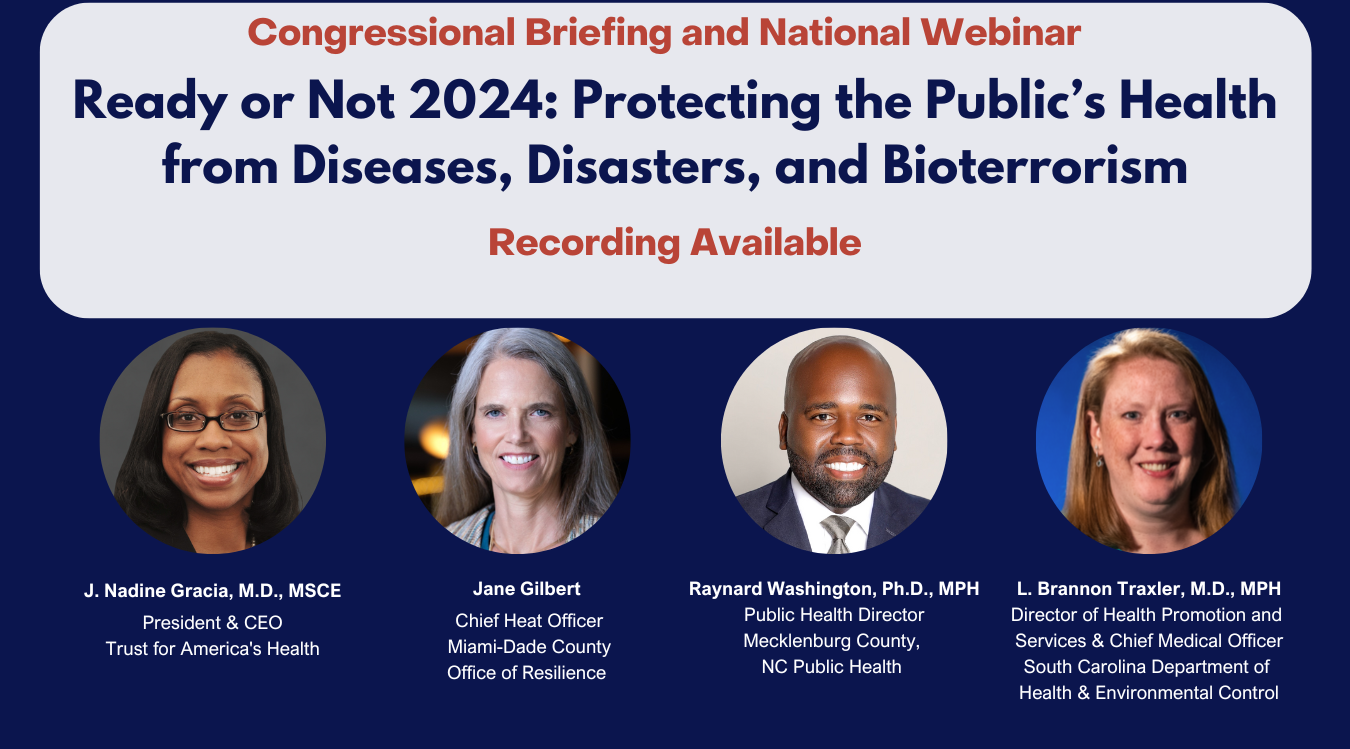Issue Category: Issues
Ready or Not 2025: Protecting the Public’s Health from Diseases, Disasters, and Bioterrorism
2024 Year in Review and Looking Ahead to 2025
During 2024, Trust for America’s Health (TFAH) continued its work to create a more resilient, trusted, and equitable public health system, and a healthier nation.
TFAH continued its work in a number of critical issue areas to improve the nation’s health, including emergency preparedness, public health funding, chronic disease prevention, the role of food and nutrition policy in stemming the nation’s obesity crisis, preventing substance misuse and suicide, supporting healthy aging, and addressing the health impacts of climate change and other environmental health risks.
Progress and Risks
The nation’s public health system is at an inflection point; progress has been made in many areas but there are also continuing and potential new risks to the nation’s health. The following are examples of areas of progress and areas of risk.
Areas of progress:
- Drug overdose deaths, including from fentanyl, are down. The reduction can be credited in part to the increased availability of treatment options and the adoption of harm reduction strategies such as readily available naloxone, the overdose reversal drug, in many communities. However, disparities persist, with overdose rates increasing in many Black and Native American communities.
- COVID-19 infection rates are currently low across the country, a testament to what can be achieved when the public health community rallies and has the funding and resources necessary to meet an immediate challenge.
- Investments in public health data modernization, wastewater surveillance, and the Centers for Disease Control and Prevention’s (CDC) Center for Forecasting and Outbreak Analytics have improved the nation’s ability to identify and track emerging health threats. The Center has awarded more than $100 million to partners who are technologically advancing the use of outbreak data to control infectious disease spread.
- Fifty-nine state and local health departments have earned Age-Friendly Public Health Systems Recognition Status through TFAH’s Age-Friendly Public Health Systems initiative by making healthy aging a core function of the department. In addition, four public health organizations and 154 individual public health practitioners have been recognized as public health champions.
- Fifteen states and D.C. have adopted paid sick leave laws which require private employers to provide paid sick leave to employees attending to their own or a family member’s health. Alaska, Missouri, and Nebraska will require employers to provide paid sick leave beginning in 2025. Paid sick leave has been a long-standing TFAH policy recommendation.
Areas of risk:
- Public health faces a serious funding cliff as monies infused into the public health system as part of the pandemic response are expiring or in some cases rescinded. The loss of such funding returns the public health system to the state of underfunding it experienced for decades prior to the global pandemic. TFAH’s annual report, The Impact of Chronic Underfunding on America’s Public Health System 2024: Trends, Risks, and Recommendations called attention to the critical need to increase investment in public health on a sustained basis.
- The COVID-19 pandemic exposed serious gaps in the nation’s emergency infrastructure that have not been fully addressed. Furthermore, misinformation about the pandemic, particularly about lifesaving COVID-19 vaccines, contributed to an uptick in mistrust of public health officials that could lead to more vaccine hesitancy and challenges to important public health authorities, all of which could make containing future disease outbreaks more difficult.
- New disease outbreaks such as the H5N1 Bird Flu could grow.
- Rates of recommended childhood vaccinations are down.
- Health disparities continue to impact the nation. Rates of chronic disease are on the rise in every community but are higher, for example, among many communities of color and in rural communities, due to structural barriers to health like access to healthy and affordable food, secure housing, and opportunities for physical activity in those communities.
- Health risks are also increasing due to an increase in the number and severity of weather-related incidents including extended periods of extreme heat and extreme heat in regions of the country unaccustomed to such weather.
Working With Partners and Providing Leadership to Strengthen the Nation’s Public Health Ecosystem
TFAH released its Pathway to a Healthier America: A Blueprint for Strengthening Public Health for the Next Administration and Congress in October, after consultation with more than 45 experts, practitioners, organizations, and community members. The Blueprint provides the incoming Administration and Congress a policy roadmap for improving the nation’s health, economy, and national security within six priority areas: 1) invest in public health infrastructure and workforce, 2) strengthen prevention, readiness, and response to health security threats, 3) promote the health and well-being of individuals, families, and communities across the lifespan, 4) advance health equity by addressing structural discrimination, 5) address the non-medical drivers of health to improve the nation’s health outcomes, and 6) enhance and protect the scientific integrity, effectiveness, and accountability of agencies charged with protecting the health of all Americans.
Working with partners across multiple sectors is central to TFAH’s work. TFAH staff led or participated in a number of coalitions during 2024, including the Coalition for Health Funding, the CDC Coalition, the Common Health Coalition, the Well-Being Working Group, the Injury and Violence Prevention Network, National Alliance for Nutrition and Activity, the Coalition to Stop Flu, the Adult Vaccine Access Coalition, the Age-Friendly Ecosystem Collaborative, the National Alliance to Impact the Social Determinants of Health, the National Commission on Climate and Workforce Health, and the National Council on Environmental Health & Equity.
Advocating for Evidence-Based Solutions
A healthy community supports the health of individuals and families by creating access to non-medical drivers of health such as secure housing, transportation, quality healthcare, high-quality childcare and educational opportunities, and jobs that pay a living wage. Such health security supports individuals, families, communities, and the nation’s economy.
Throughout the year, TFAH convened partners to strategize ways to effectively advance health promoting policies and programs at the federal and state levels. In addition, TFAH staff worked with numerous federal agencies and offices, like CDC, FDA, and SAMHSA, as well as public health organizations such as the Association of State and Territorial Health Officials (ASTHO), the National Association of County and City Health Officials (NACCHO), Big Cities Health Coalition, and the National Governors Association to advance policies and garner support for programs that will improve Americans’ health. Among TFAH’s legislative goals for 2024 and moving into 2025 are increased and sustained investment in public health agencies, infrastructure, and programs; passage of a new Farm bill that provides access to nutrition support programs; reauthorization of the Pandemic and All Hazards Preparedness Act and the Older Americans Act; and passage of the Public Health Infrastructure Saves Lives Act and the Social Determinants of Health Act.
These advocacy efforts earned numerous policy wins, including the U.S. Department of Agriculture’s (USDA) updates to school meals formulas and the Special Supplemental Nutrition Program for Women, Infants, and Children (WIC) benefit food packages that aligns with TFAH recommendations.
TFAH’s core annual reports, which track data and recommend policy solutions in the areas of emergency preparedness, public health funding, preventing substance misuse and suicide, and addressing the nation’s obesity crisis, continue to be a critical source for data trends and evidence-based policy and program solutions for health officials, policymakers, other decision-makers, and advocates across the country.
Making Healthy Aging a Core Function of Local Health Departments
Through its Age-Friendly Public Health Systems Initiative (AFPHS), TFAH continues to provide guidance and resources to state and local health departments to help them promote healthy aging in their communities. During 2024, AFPHS co-hosted the 2024 National Healthy Aging Symposium with the U.S. Department of Health and Human Services’ (HHS) Office of Disease Prevention and Health Promotion. The symposium brought together speakers from sectors across all levels of government, philanthropy, academia, nonprofits, community-based organizations, tribal representatives, and others who shared their perspectives on important topics related to healthy aging including caregiving, brain health, the caregiving workforce, transportation, housing, and social engagement. TFAH also launched the Age-Friendly Ecosystem Collaborative to continuously engage organizations and sectors central to healthy aging.
Supporting Public Health Communicators
TFAH continues to be a managing partner of the Public Health Communications Collaborative (PHCC). PHCC provides no-cost messaging resources and communications training to state and local health departments to help the field effectively address the public’s information needs on public health issues. The Collaborative was first established during the COVID-19 pandemic and now works across the public health sector on such issues as H5N1 Bird Flu, Mpox, protecting health during periods of extreme heat, and vaccine confidence. Its training materials include resources on strengthening public health through community engagement, responding to misinformation, and using social media in health communications. The PHCC newsletter is shared with over 38,000 opted-in subscribers, and its website has earned over 1.2 million page views since its launch in 2020.
Looking Ahead
The 2025 calendar year promises to be pivotal for the nation’s health. TFAH looks forward to bringing evidence-based policy recommendations to the new Administration and Congress, particularly on issues such as emergency preparedness, chronic disease prevention, mental health, veterans’ and rural health, and investing in prevention to reverse the pattern of increasing healthcare spending without better health outcomes. We are committed to making the case for policies and programs that address the non-medical drivers of health in order to promote the nation’s health and economic security.
The Nation’s Public Health System is at an Inflection Point
New Report Provides the Next Administration and Congress a Policy Roadmap for Improving the Nation’s Health, Economy, and National Security
(October 8, 2024 – Washington, DC) – The public health system—responsible for protecting and promoting health in every community— needs sustained investment, policy support, and protection from political interference, according to a new report released today by Trust for America’s Health.
The report, Pathway to a Healthier America: A Blueprint for Strengthening Public Health for the Next Administration and Congress, identifies six priority areas and includes policy recommendations that, if adopted, will improve health outcomes and bolster the nation’s economic and national security.
Americans are living longer, thanks in part to public health. Public health interventions, such as improved sanitation, enhanced vaccination access and stronger infectious disease control, improved nutrition, tobacco use prevention, and addressing preventable injury, were the largest contributing factors to life expectancy increases over the last century.
However, too many Americans are still suffering from preventable health problems. Over the last few decades, increasing rates of chronic diseases and alarming levels of substance use disorder and suicides threaten the public’s health. Furthermore, weather-related emergencies are occurring more frequently, and population-level health disparities persist.
Public health is at risk on several fronts. Underfunding has weakened the public health infrastructure and its workforce. Mis- and disinformation and politicization have contributed to distrust of public health officials and guidance. Public health’s ability to protect communities is also at risk due to proposed or enacted policies that undermine the role of public health officials or access to preventive healthcare.
“This Blueprint Report provides a roadmap for the Administration and Congress taking office in January to improve the health and well-being of the nation. We know what works in public health and that when Congress and the Administration act in support of public health, the return is improved preparedness and individual and community health and safety,” said J. Nadine Gracia, M.D. MSCE, President and CEO, Trust for America’s Health. “The next Administration and Congress will have an important opportunity to enable all Americans to enjoy optimal health.”
2024 Blueprint Priority Areas and Highlighted Recommendations
This report includes recommendations across six priority areas to protect and strengthen public health, prevention, and our nation’s health security. The following are highlighted recommendations from the report. See the report for the inclusive set of recommendations.
Priority 1: Invest in Infrastructure and Workforce to Ensure Our Public Health System Can Meet the Challenges and Opportunities of the 21st Century.
- Congress should protect and increase overall funding for the Centers for Disease Control and Prevention (CDC).
- Congress should ensure continuous improvement of public health infrastructure.
- Congress should invest in public health data modernization and enact the Improving DATA in Public Health Act to better detect and contain health threats.
- Congress and HHS agencies should support efforts to bolster recruitment, retention, and resilience of the public health workforce.
Priority 2: Strengthen Prevention, Readiness, and Response to Health Security Threats.
- The White House should maintain coordination and leadership around public health emergencies and biodefense, and the White House and Congress should renew the nation’s Global Health Security Commitment.
- Congress should expand public health emergency preparedness funding for state, tribal, local, and territorial jurisdictions.
- Congress and the Administration for Strategic Preparedness and Response should strengthen the emergency readiness of the healthcare delivery system.
- Congress should enact legislation to ensure access to vaccines for uninsured and underinsured adults.
- Congress should support nationwide efforts to protect against environmental and climate-related health threats, including extreme heat.
Priority 3: Promote the Health and Well-being of Individuals, Families, and Communities Across the Lifespan.
- Congress should increase funding to CDC’s National Center for Chronic Disease Prevention and Health Promotion.
- Congress should enhance benefits in and protect access to the Supplemental Nutrition Assistance Program and should make healthy school meals for all permanent.
- Congress should create a national standard requiring employers to provide job-protected paid sick, family, and medical leave for all employees.
- Congress and HHS should address Adverse Childhood Experiences (ACEs) by passing the Preventing Adverse Childhood Experiences Act and increasing the investment in the CDC ACEs program.
- Congress should fund the nationwide implementation of CDC’s Comprehensive Suicide Prevention Program and support Substance Abuse and Mental Health Services Administration’s efforts to bolster the continuum of crisis care.
- Congress and the Administration should fund CDC’s internal capacity for healthy aging efforts and its support to build and sustain age-friendly public health systems in state, local, tribal, and territorial public health departments.
Priority 4: Advance Health Equity by Addressing Structural Discrimination.
- Federal agencies should regularly update and report progress on agency equity plans, ensuring metrics are inclusive of and extend beyond tracking disparities.
- Congress and the Administration should ensure accurate and complete data collection to report health-related information by race/ethnicity, age, sex, disability, language, sexual orientation, gender identity, and geography.
- Federal health agencies should focus funding on populations at elevated risk for chronic disease and poor health outcomes due to the impact of structural discrimination and disinvestment.
Priority 5: Address the Non-Medical Drivers of Health to Improve the Nation’s Health Outcomes.
- Congress should increase funding to $150 million for the Social Determinants of Health program at CDC and pass the Improving Social Determinants of Health Act.
- The Administration should continue to build on the Centers for Medicare & Medicaid Services’ (CMS) efforts to support Medicaid, Medicare, and Children’s Health Insurance Program coverage of patients’ health-related social needs.
- CMS and Congress should explore opportunities to expand the capacity of healthcare providers and payers to screen and refer individuals to social services.
- Congress should amend tax laws to increase economic opportunity for families by expanding access to the Child Tax Credit and Earned Income Tax Credit.
Priority 6: Enhance and Protect the Scientific Integrity, Effectiveness, and Accountability of the Agencies Charged with Protecting the Health of all Americans.
- The Administration and Congress should maintain the existing structure of federal health agencies, which have specific roles and expertise in protecting the nation’s health.
- The Administration should protect the scientific integrity of public health agencies and leaders.
- Congress and HHS should invest in and prioritize effective public health communications and reducing the spread of misinformation and disinformation.
- Lawmakers and courts should reject laws that weaken or preempt public health authorities, which could threaten basic public health protections such as outbreak detection, vaccination, and response.
Read the full report
Trust for America’s Health is a nonprofit, nonpartisan public health research, policy, and advocacy organization that promotes optimal health for every person and community and makes the prevention of illness and injury a national priority.
Pathway to a Healthier America: A Blueprint for Strengthening Public Health for the New Administration and Congress
State of Obesity 2024: Better Policies for a Healthier America
Pain in the Nation 2024: the Epidemics of Alcohol, Drug, and Suicide Deaths
TFAH Recognizes Juneteenth
(Washington, DC – June 18th, 2024)
In honor of our mission to promote optimal health for every person and community, TFAH is proud to celebrate and recognize Juneteenth.
The Juneteenth federal holiday recognizes the end of Black enslavement in Texas in 1865 — a two-and-a half-year delay of freedom after the signing of the Emancipation Proclamation. The holiday celebrates the resilience and achievement of Black Americans and also serves as a reminder that structural racism, especially for Black Americans, continues to be a barrier to well-being and opportunity for many in this country.
TFAH is committed to advancing policies that ensure equitable access to the economic, social and environmental factors that allow people to enjoy optimal health. Supporting these efforts advances opportunities for communities of color facing structural disadvantage. That includes:
- Make advancing health equity and eliminating health disparities a national priority.
- Support community-driven, multisector efforts to address upstream drivers of poor health through CDC’s Social Determinants of Health and Racial and Ethnic Approaches to Community Health (REACH) Programs.
- Invest in a diverse public health workforce and build the pipeline of workers, including through loan repayment and other recruiting and retention programs.
- Ensure the public health infrastructure meets the needs of all communities, including complete, disaggregated data collection.
- Ensure access to high-quality healthcare for all.
- Create a national standard guaranteeing job-protected paid family, sick, and medical leave for all employees.
- Expand efforts to protect against health impacts of climate change, including extreme heat, which disproportionately impact populations of color.
- Increase nutrition security through successful programs like the Special Supplemental Nutrition Program for Women, Infants, and Children (WIC) and Supplemental Nutrition Assistance Program (SNAP) and alleviate poverty through tax credits for working families, such as Earned Income Tax Credit.
- Center communities and people of color when developing health promoting strategies. Agencies and organizations should work with communities that are disproportionately impacted and incorporate their voice and lived experience in decision-making wherever possible.
Ready or Not 2024: Protecting the Public’s Health from Diseases, Disasters, and Bioterrorism
The Ready or Not 2024: Protecting the Public’s Health from Diseases, Disasters, and Bioterrorism report identifies gaps in national and state preparedness to protect residents’ health during emergencies and makes recommendations to strengthen the nation’s public health system and improve emergency readiness. As the nation experiences an increasing number of infectious disease outbreaks and extreme weather events, the report found that while emergency preparedness has improved in some areas, policymakers not heeding the lessons of past emergencies, funding cuts, and health misinformation put decades of progress at risk.
Resource:







